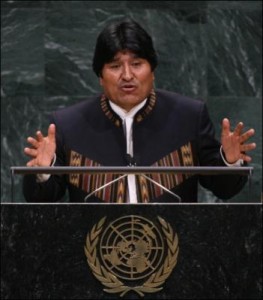
A year after his re-election as president of Bolivia with 64% of the vote, Evo Morales’ popularity fell to 30%, its lowest level since coming to power in 2006 following its decision to raise fuel.
The leftist leader, who in January 2010, accumulated 64% of preferences launched its measures for the adjustment of gasoline up to 83% on 25 December last year but had to withdraw by popular pressure after six days.
The protests were strongest in the cities of La Paz and neighboring El Alto Cochabamba that left 15 injured and 21 arrested.
“A survey at the time of measurement does not reflect at all the president’s popularity, on Monday reacted presidential spokesman Ivan Canelas, who said Morales, who went by the weekend touring rural areas of the country,” continues enjoying the same popularity.”
One of the first manifestations of this uncertainty is the absence of some foods and the de facto lifting their prices, causing unrest among the population, as urban transport decision to increase tariffs unilaterally.
The powerful group of people from La Paz and El Alto that supported Evo election announced that they will take back to the streets if they raise the fares.
It was they who in December last week took to the streets against the ‘gasolinazo’, they bent their arm to their leader and forced him to reverse his action.
Facing this new situation, the political scientist Susan Seleme, a strong opponent of Evo, said “the very m(–foul word(s) removed–) (who elected him) are the pride of the enervating rocked Morales” and that “with the same weapons that the power he might not be overthrown, but they know they can do it.”
The anthropologist and priest Xavier Albo, professor and related to the left, said “the gasolinazo led us down to earth” and called for focusing interest “in the regulatory role of social movements are precisely those that have been pushed back to initial roadmap. ”
The government through Canelas said that “does not take into account these polls, but yes we noted to investigate to see what might be happening, just for that. So we’ll wait what happens in the future.”
Morales is trying to convince people of the need to increase the price of petrol to remove the annual subsidy on fuel which is 380 million dollars, of which 150 million are smuggled to neighboring countries such as Brazil, Peru, Argentina, Chile and Paraguay.
Bolivia has a burning up of 35,000 barrels per day, and in 2010 it only produced about 4,500 barrels per day. The deficit is imported from Venezuela and Argentina chiefly and sells at a subsidized cost. In the light of these events it could be concurred that Bolivia might be going towards a political turmoil.
